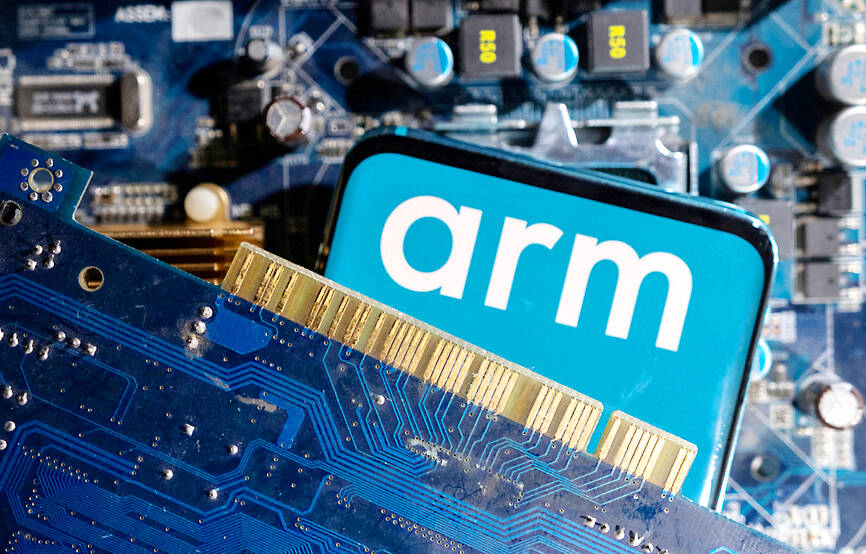Arm Ltd, a chip designer that is preparing for what would be the biggest initial public offering (IPO) this year, saw its revenue decline about 1 percent in the most recent fiscal year, according to a draft filing for its IPO reviewed by Bloomberg.
Companies often look to post rising revenue in the periods leading up to stock sales, but Arm’s sales fell to US$2.68 billion in the 12 months ended on March 31, according to the filing, which is still subject to change. Japan’s Softbank Group Corp, which owns Arm, plans an IPO of the company as soon as next month that could value the chip designer at as much as US$70 billion.
Arm’s draft F-1 filing is based on US accounting rules as the company prepares to list on NASDAQ. In May, Softbank said sales at the unit had grown 5.7 percent in the latest fiscal year under international standards.

Photo: Reuters
US accounting rules and International Financial Reporting Standards (IFRS) have separate thresholds for when revenue can be recognized.
The overall chip industry is still emerging from a sales slump triggered by a buildup of excess inventory, especially in the smartphone market — a central focus for Arm. Qualcomm Inc, one of Arm’s biggest partners, gave a disappointing forecast for the latest quarter earlier this month, sending its shares tumbling. And even Apple Inc’s prized iPhone has seen demand slow.
Arm’s draft filing shows sales for the quarter ended June 30 fell 2.5 percent to US$675 million under US standards. That is a smaller drop than Softbank reported earlier this month, when it said sales for the unit fell about 11 percent to US$641 million under IFRS.
Arm designs technology including microprocessors, and its intellectual property is used in just about every smartphone in the world. It was publicly traded until 2016, when Softbank bought it for around US$32 billion. The Japanese conglomerate said in 2020 that it was selling the company to Nvidia Corp for US$40 billion, but regulatory pressure forced Nvidia to abandon its bid last year. Arm said in April it had made a confidential filing for a US IPO.
The filing could be made public as early today, people familiar with the matter said. Arm is expected to sell about 10 percent of the company’s shares in the listing.
A representative for Arm declined to comment.

Taiwan will prioritize the development of silicon photonics by taking advantage of its strength in the semiconductor industry to build another shield to protect the local economy, National Development Council (NDC) Minister Paul Liu (劉鏡清) said yesterday. Speaking at a meeting of the legislature’s Economics Committee, Liu said Taiwan already has the artificial intelligence (AI) industry as a shield, after the semiconductor industry, to safeguard the country, and is looking at new unique fields to build more economic shields. While Taiwan will further strengthen its existing shields, over the longer term, the country is determined to focus on such potential segments as

UNCERTAINTY: Innolux activated a stringent supply chain management mechanism, as it did during the COVID-19 pandemic, to ensure optimal inventory levels for customers Flat-panel display makers AUO Corp (友達) and Innolux Corp (群創) yesterday said that about 12 to 20 percent of their display business is at risk of potential US tariffs and that they would relocate production or shipment destinations to mitigate the levies’ effects. US tariffs would have a direct impact of US$200 million on AUO’s revenue, company chairman Paul Peng (彭雙浪) told reporters on the sidelines of the Touch Taiwan trade show in Taipei yesterday. That would make up about 12 percent of the company’s overall revenue. To cope with the tariff uncertainty, AUO plans to allocate its production to manufacturing facilities in

COLLABORATION: Given Taiwan’s key position in global supply chains, the US firm is discussing strategies with local partners and clients to deal with global uncertainties Advanced Micro Devices Inc (AMD) yesterday said it is meeting with local ecosystem partners, including Taiwan Semiconductor Manufacturing Co (TSMC, 台積電), to discuss strategies, including long-term manufacturing, to navigate uncertainties such as US tariffs, as Taiwan occupies an important position in global supply chains. AMD chief executive officer Lisa Su (蘇姿丰) told reporters that Taiwan is an important part of the chip designer’s ecosystem and she is discussing with partners and customers in Taiwan to forge strong collaborations on different areas during this critical period. AMD has just become the first artificial-intelligence (AI) server chip customer of TSMC to utilize its advanced

Chizuko Kimura has become the first female sushi chef in the world to win a Michelin star, fulfilling a promise she made to her dying husband to continue his legacy. The 54-year-old Japanese chef regained the Michelin star her late husband, Shunei Kimura, won three years ago for their Sushi Shunei restaurant in Paris. For Shunei Kimura, the star was a dream come true. However, the joy was short-lived. He died from cancer just three months later in June 2022. He was 65. The following year, the restaurant in the heart of Montmartre lost its star rating. Chizuko Kimura insisted that the new star is still down